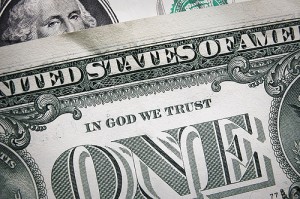From the Prophet Micah:
Put no trust in a friend,
have no confidence in a loved one;
guard the doors of your mouth
from her who lies in your embrace;
for the son treats the father with contempt,
the daughter rises up against her mother,
the daughter-in-law against her mother-in-law;
your enemies are members of your own household.
But as for me, I will look to the Lord,
I will wait for the God of my salvation;
my God will hear me.
(From the Daily Office Lectionary – Micah 7:5-7 – October 15, 2012)
 Sound familiar? Jesus sounded a lot like Micah at times:
Sound familiar? Jesus sounded a lot like Micah at times:
Do not think that I have come to bring peace to the earth; I have not come to bring peace, but a sword. For I have come to set a man against his father, and a daughter against her mother, and a daughter-in-law against her mother-in-law; and one’s foes will be members of one’s own household. (Matt. 10:34-36; cf. Luke 12:51-53)
Micah is the same prophet who authored what may be my favorite verse in all of the Old Testament: “He has told you, O mortal, what is good; and what does the Lord require of you but to do justice, and to love kindness, and to walk humbly with your God?” (6:8) And Jesus is the same preacher who said “Love your neighbor as yourself” was one of the greatest commandments. (Mark 12:31) How does one reconcile these admonitions with advice to put no trust in friend or loved one and promises to bring enmity between family members?
The answer lies in the last part of the above quotation from Micah: Trust in God. In the 1950s the U.S. Congress decided to emblazon “In God We Trust” across American currency as a response to the rise of “Godless communism” in the Soviet Union and its sphere of influence. One may debate whether it was appropriate under the U.S. Constitution, or whether it has since had any salutary effect, but it is what Micah models here, and it is the message of Scripture and of Jesus. “Don’t trust human beings! Trust God!”
In the last weeks of the U.S. presidential campaign, as political debates lead to family arguments and people begin to see the members of their own households as political enemies, it is well to remember this. Human beings, even the best of us, are fallible and untrustworthy, especially the ones we put on pedestals and look to to solve the problems of our nation or our world. As the Psalmist (echoing Micah’s sentiment) reminded us, “Put not your trust in rulers, nor in any child of earth, for there is no help in them.” (Ps. 146:2, BCP version)
It may sound trite. It may be misplaced on our currency. But it is the only solution: “In God We Trust.” If we remember that, maybe we can all just get along . . . .
====================
A request to my readers: I’m trying to build the readership of this blog and I’d very much appreciate your help in doing so. If you find something here that is of value, please share it with others. If you are on Facebook, “like” the posts on your page so others can see them. If you are following me on Twitter, please “retweet” the notices of these meditations. If you have a blog of your own, please include mine in your links (a favor I will gladly reciprocate). Many thanks!
====================
Father Funston is the rector of St. Paul’s Episcopal Church, Medina, Ohio.



Leave a Reply